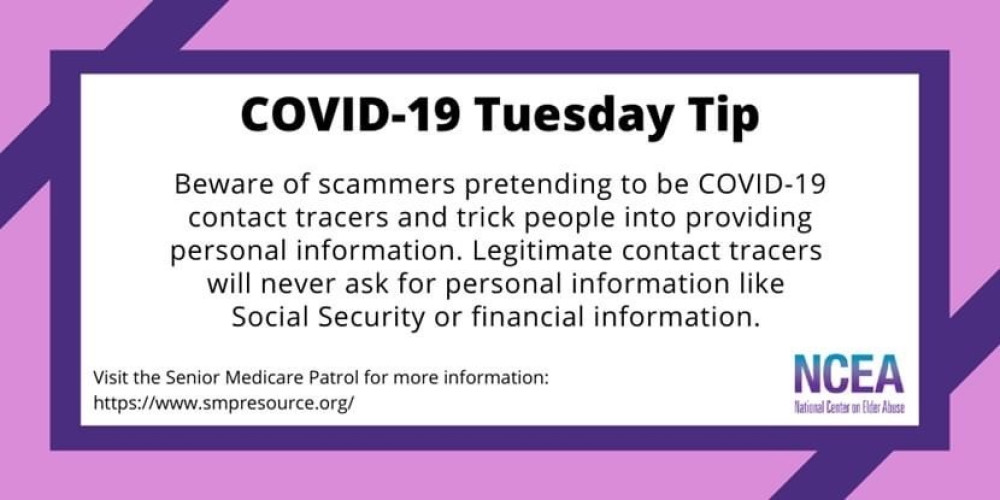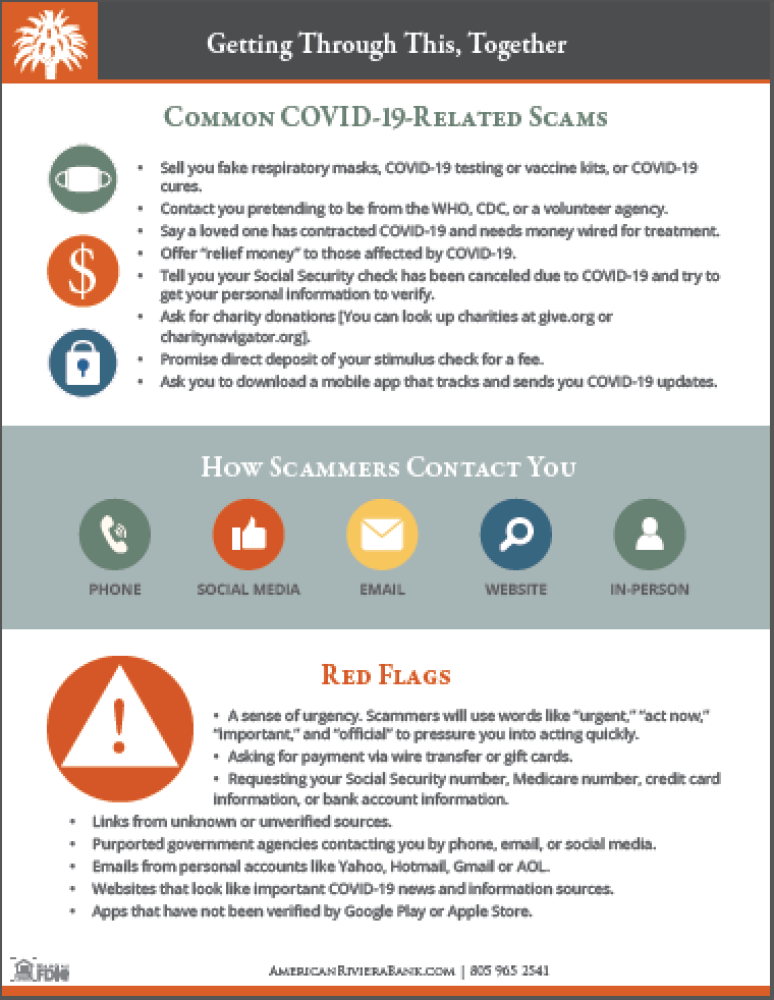

June is World Elder Abuse Awareness month, and today we wanted to shine the light on new variations of common scams targeting older adults. It’s no secret that scammers follow the headlines, and it didn’t take long for them to start using COVID-19 as the new bait to hook their victims.
We’ve previously shared warnings of phishing attempts from the Secret Service, and scams involving economic impact payments from the Department of Business Oversight, but closer to home, the San Luis Obispo County District Attorney issued a warning due to reports of phone scams and price gouging. Phone scams included requests for gift cards to post bail at the Sherriff’s office as well as a scam where seniors were being targeted to purchase the cards to receive food delivery during self-isolation.
According to District Attorney Dan Dow, "You will never be asked to pay for our food delivery service in our county. County staff, whether it's at the DA's Office, the Sheriff's Office, or any other department, we will never ask you to pay for any kind of service that we're providing, certainly not in the form of gift cards."
While it is unthinkable that these fraudsters would take advantage of people at their most vulnerable time, while self-isolating at home and unable to get access to basic supplies and food, it an unfortunate realty, and educating yourself on the red flags is one of the very best ways you can protect yourself and your loved ones. In this blog, we’ll give you a quick summary of some of the most common COVID-related scams and how to spot them.
Today we’re publishing a flyer on COVID-related scams that includes current contact information for reporting financial abuse in the Santa Barbara and San Luis Obispo counties. While we haven’t seen many reports in our local communities of COVID-19-related scams, we’re concerned that it’s because customers aren’t reporting them to their bankers due to less foot traffic in branch lobbies as a result of self-isolation and shelter-in-place orders. Less access, combined with mandatory social distancing requirements at the teller stations, such as masks and Plexiglas shields, make it more challenging to carry on conversations with clients that might help to uncover when someone has fallen prey to a scam. In addition to the agencies for reporting and responding to financial abuse we’ve included on our COVID-19 flyer, the Elder & Dependent Adult Abuse Prevention Council of Santa Barbara County has also published an Elder Justice Resource Guide for Action in association with the Central Coast Commission for Senior Citizens, Area Agency on Aging.
Another common financial exploitation scam targeting seniors begins with aggressive phone or online sales tactics for products promising anti-aging or health benefits but do nothing to “cure” ailments as they might allege. Health officials warn that any claim that someone selling a vaccine or drug to cure COVID-19 or provide health benefits to keep you from contracting the virus is a hoax. There is currently no vaccine or drug that can prevent or treat the coronavirus.
The IRS warns that their Criminal Investigation division (CI) has already seen scams related to the organized selling of fake at-home test kits, offers to sell fake cures, vaccines, pills and advice on unproven treatments for COVID-19. They note that other scams purport to sell large quantities of medical supplies through the creation of fake shops, websites, social media accounts and email addresses where the criminal fails to deliver promised supplies after receiving funds.
The FBI issued an industry alert on a variation of these tactics, warning buyers of fraud trends related to purchases of personal protective equipment (PPE), medical equipment such as ventilators, and other supplies or equipment in short supply during the current COVID-19 pandemic. Government agencies also reported “advance fee schemes” where a victim pre-pays (partially or in full) a purported seller or a broker for a good or service and then receives little or nothing in return.
Industry research has also been issued for fake “coronavirus tracker” apps that claim to track the spread of coronavirus, but install malware on your computer once downloaded. This malware is designed to steal your password, credit card data, or other personal information that is stored within your web browser.
Imposter scams are exactly like they sound. The fraudster purports to be a government official or someone you know, when in reality they just want your money or your information. It is true that public health officials are using phone and electronic means for contact tracing to trace and monitor contacts of infected people and notify them of their exposure, but you should be aware that they will never ask you for money!
This is a hard one to judge because legitimate health officials do ask for your personal information to verify you, however, they will typically use the telephone and you should be immediately suspicious of any unsolicited message via text, email, or a social media messenger claiming you’ve been exposed to someone who has tested positive for COVID-19. The message might instruct you to self-isolate with a link for more information. Don’t click! These links can contain malware.
You might also receive a call from someone who claims to be from the WHO or CDC saying that you’ve been exposed to someone who tested positive for COVID-19 in attempt to steal personal or financial information. In a real scenario, a contract tracer will ask you for your name or date of birth to verify your identity, but in most cases, they will already have this information on file. They will also ask about your current health, medical history, and recent travels. They will not ask for any government identification numbers or bank account details.
You should never provide your social security number over the phone. And hang up the phone immediately if you are ever asked for financial information. The Better Business Bureau maintains a COVID Scam page with helpful information on this and other COVID-related. In addition, if you’ve been a victim of a scam, you can report it at BBB.org/ScamTracker.
Charity scams are among the oldest scams used by fraudsters because they are largely successful. Playing on your emotions and sympathy for others, they might trick you into donating money for COVID-related causes while “gathering money for families affected by the virus”. They may even contact you pretending to be a volunteer agency to assist those in need or who are self-isolating. Make sure you do your own research. Don’t give cash or gift cards and NEVER wire a donation. If they won’t accept a personal check, it’s a good indicator that it’s a scam because they don’t want you to sleep on it and place a stop payment the next day. No matter the request, you should always verify the legitimacy of the organization. You can look up a charity at give.org or charitynavigator.org, and you should always do your homework to verify where the money is going.
Consider a personal policy where you do not respond to phone solicitations, and instead make your own decisions in advance about the organizations you want to donate to. The IRS also issued an alert that includes helpful information for action if you feel you’ve fallen prey to a COVID-related scam, such as being asked to pay a fee to receive your Economic Impact Payment or donating to a fake charity.
Follow us on social media for tips such as this one to assist you and your loved ones in identifying financial scams. We’ve also included information on the “Fraud” section of our COVID-19 web page. We encourage you to check back frequently for our COVID-19 scam guide and other helpful information. In the meantime, stay well!

